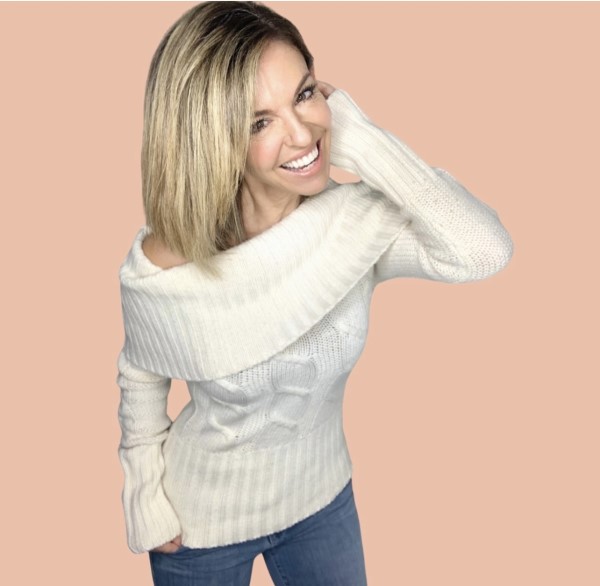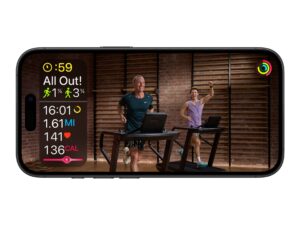A three-story Times Square billboard at West 48th Street and Seventh Avenue, reading “Feeling Fat and Lazy?” over an image of a woman sitting with her head in her hands has sparked a controversy that has it’s roots in Canada. Deborah Capaccio, a former Torontonian, now residing in the USA, made a splash when she bought a billboard to the tune of $13,000 for 4-weeks at one of New York City’s busiest intersections. The certified high-performance coach and physical therapist who launched Sparkle Girl, on May 3rd has become viral. Actress Jameela Jamil and other high-profile influencers bashed the billboard.
Capaccio said that the very media outlets that she pitched prior to the billboard with the headline “Wellness Coach Transforming Women’s Minds First, Bodies Second”, received very little pick up. No one cared. Capaccio’s mission was always to impact women on a massive scale. She doesn’t deny the fact that the billboard caused a stir, but her hopes were that she would reach those thousands of women that she never would have otherwise and it worked.
There is no doubt that the billboard was controversial and the phrasing could be a trigger for some, but after watching the news reports and hearing Capaccio stand firmly by the creative and accepting the backlash, we wanted to learn more. The debate around it and why she had to go this route to get her story told made us wonder, are we so immune to good news stories, that only something truly shocking can get us talking about our own wellness (mental and physical)? Are we so afraid to say anything as a society that we wind up saying nothing? Whether you like the creative or not, it definitely sparked a conversation that we need to have, so we went directly to the source and spoke with Capaccio. The goal was to learn more and get past the sound bite to find out the “why” behind the controversy.
How did you lose your sparkle and what steps did you take to get it back?
The journey for me started years ago when I chose a career as a trained physical therapist. I worked in that profession for 22 years. I was just another one of those humans out there who chose a profession because it was what her parents felt fit in that box of you will be a professional – whether it was a doctor, lawyer or physical therapist – this is what the expectation is and you will have an esteemed job and that’s what you will do. I chose a profession that wasn’t near and dear to my heart. What happened over time was that I had a gnawing knowing that I was meant for more and that I could impact women from an empathetic, altruistic, leadership space that I wasn’t able to fulfill in my everyday job. What I found was that I was going through the motions of life, unfulfilled, miserable in my job, feeling as though my ship had sailed. I was now 47.
My life wasn’t terrible but I was feeling lackluster and it was translating into other areas. I was eating more and gaining weight. I was drinking excessively. I was snappy and short with my family and loved ones because I had this deep feeling that I was out of alignment with myself. I like to say that I had lost my sparkle. I was told by many people when I was growing up that I was effervescent, charismatic, you have so much life, and I was dull. I found myself on my 47th birthday sitting across the table from my wonderful husband and had the perfect life on paper. He was physician, I worked part-time, nothing to complain about. But all that I could think of was that I had let myself go. My pants were too tight, digging into me. I was out of control drinking and I was a loser and a failure. At that moment, when I was supposed to be enjoying dinner with my husband, I was fighting back tears.
We were driving home and it was silent. My husband looked and me and asked what was wrong? I just lied and said nothing, but when we got home, I had a vision of my 50th birthday that was right around the corner. I had a flash that if I continue on this trajectory and don’t figure out who I’m supposed to be and what my true passion is, I’m very nervous about what my life will look like. I made this mental commitment, that I was going to do everything to figure this out. I didn’t know how, but I had this trusting knowing that it would come to me and a line was drawn in the sand.
From that day forward, and fast forward three years, I was able to get in the best physical shape of my life. The best mental shape of my life. Quit a 20-year career that I hated. Pursued and succeeded at an online wellness business and inspired and changed the lives of hundreds of women. It’s now clear that my purpose was to figure out how to do it myself first, and then share that process that I’ve been able to streamline with as many women as possible who can relate to what I’m saying and share that process.
Your website talks about “Brain first. Body second.” Tell us about your approach to helping your clients.
Most of the women that I speak to initially see a fit person at 50. They want me to tell them what to eat and how much to exercise. I used to do the same thing and I yo-yoed. By no means was I ever obese, but one thing that I’ve also learned is that it’s never about your size or shape, it’s how you feel. The skinniest woman on the block can still feel fat. The heaviest woman on the block can feel fine, but it’s never about that. What I learned was that in order to lose weight, keep it off, be optimally healthy and be the most confident that I ever have been was that I had to start with readjusting my brain, my thoughts, my patterns, my habits that were deeply ingrained around body image, food, self-love – anything to do with wellness and health.
I called the program “Brain first. Body second.” because the process that I came upon during those three years, looking back was that I had to reprogram my mind first in order to have the lasting, permanent, authentic results that my body shows the world, second. It is the only way and I am so passionate about it because we aren’t serving women. What we are doing is handing them a wellness handbook starting at chapter 4. They are Googling diet and exercise and trying the same ones over and over. They are failing, they are yo-yoing and blaming themselves because all they are looking at is what to eat, when to eat, when to exercise and what to do. They do great for awhile, but until they have made that mental shift, which is a very deep, specific process involving the self-conscious that nobody talks about, they will always revert back to the habits and identities that they have held around their weight and body image. That is why it is called “Brain first. Body second.”
Why did you decide to take out a billboard in Times Square?
When I launched my business, I was so passionate about it, but I am also realistic and understand that just because you have a fantastic idea doesn’t mean that if you build it, they will come. I built it and couldn’t wait, but the reality is that I’m not Kylie Jenner or Oprah and I’m not a woman with 900,000 followers on Instagram where I could just talk about my process. It didn’t have the social proof and credibility yet. I have a lovely following of women, but it’s small and those women have done amazingly well on my program. I have a mission that I will not stop to reach the millions of women that I know call themselves fat, lazy and other terrible names. They are crying themselves to sleep at night. Their marriages are at risk They don’t have a sex life because they are self-conscious. They are short with their kids. They have medical health issues.
Getting to the billboard at Times Square – I launched my business. I had done some Facebook ads. I was starting to get some traction. I did hire a publicist realizing that I wanted the media coverage because that would be the loudest voice that I could get out there. We pitched and re-pitched my program. Two outlets picked us up – a podcast and a local station (KATU, Portland) and I’m so grateful they gave me a spot. I did get clients, then that was it.
I was frustrated because I beta-tested my program with the clients that I already established in my wellness business and the results were mind blowing. I knew that if the results were mind blowing for these people who were everyday women, just like me, that they would be equally successful on a mass scale. We weren’t getting the message out like I had wanted and the opportunity came along. The space was available. The cost was a stretch, but I could swing it and I decided that I would take the risk and I would go big or go home. I knew that the language that I chose which said “Feeling Fat & Lazy?” would cause a stir.
What made you pick the polarizing words “Feeling Fat & Lazy?” for the Times Square billboard?
When the opportunity came along and I decided that I was going to do the billboard, then the next step was to figure out what the imagery and tagline would be. It came to me instantly. When I developed my program, it was research based. I was working for two years as a wellness coach, handing out diet and exercise programs. What I found was that 80% of my clients were not sticking to it for longer than two months. 20% could do it, but 80% were yo-yoing and that’s a staircase to downward health. They are gaining more weight and losing self-esteem.
I decided to dig more deeply and ask those women questions about what their mindset was. What I found was a common thread amongst them that mirrored how I was feeling as well. These women held a negative identity around food and their body image. They used terrible language silently, daily, to describe how they felt. They called themselves names. Unprompted, I asked them to list three or four names that they called themselves, whether it was out loud to others or secretly to themselves. The top two most common words that women reported, and the research was based on hundreds of women, were “I’m fat.” “I feel fat.” “I’m fat and lazy.” “I’m a lazy ass.” It was very disturbing, but I nodded my head because I called myself fat as well. I didn’t call myself lazy, but I called myself fat, a fat pig, and other names.
I decided to take those words and use them in the billboard, as risqué and controversial as I knew they would be, because I wanted them to act as a mirror to the women that are walking around saying those words to themselves. By asking them “Feeling fat and lazy?” – hopefully women would say no, feel great and walk on by, and this isn’t for you. But for the women who were ready to be honest with themselves and admit, “actually, I do”, then perhaps they would take five seconds and go to my URL and see on my homepage immediately that they don’t have to feel alone.
The imagery is also reflective and was purposefully done. I could have had a skinny woman on the billboard and said the same thing because I believe that at any size that you can feel fat and lazy. But then, I would have had backlash for that saying that I was skinny shaming. I chose an overweight women because, by far, most of the women that have contacted me over the past two-three years for help have been medically overweight. If they took their weight, BMI and height they would be classified as obese or borderline obese and these were the women, who were feeling by far, the worst about themselves. In my opinion, these are the women who are at the highest risk for health issues. The image of me superimposed is not a mocking image. The imagery is supposed to give a signal of what a healthy woman can look like, with their sparkle back, with a smile, looking fit, because I was the woman in the picture. I wasn’t 300 pounds, but I might as well have been. I felt the same way that she felt.
How is this different from fat shaming?
Many people claimed it was fat shaming. By the same token, many women messaged me, I have DMs, screenshots and emails that said “It was like you were talking to me.” Fat shaming, in my opinion, would have been a billboard that clearly stated that “You are fat and lazy.” or “Fat and lazy.”. That is name calling. My billboard was a rhetorical question asking the passerby if they were feeling that way and I think that there is a massive difference. You can ask someone “feeling tired?” or say “you are feeling tired.” I know that it’s semantics, but it matters to me here because this was taken as a direct, empathetic reflection of what women have told me for so many years and that’s why I went for it.
You mentioned that you were ok with the backlash that came with the Times Square billboard. Why?
I was ok with it, because I knew that would be the cost for reaching the women that I otherwise never would have. I’m fine to take the heat. I’m not going to say that it was easy or pleasant – that’s new if you are not a celebrity and used to stepping into the spotlight. Of course, I’m human, but I stayed focused and kept my blinders on. I focused on the positive messages that I got, which were abundant, from women who were booking calls. To me, it’s worth it. The people who don’t find it in alignment with their values and are interpreting it as fat shaming are people that I can’t help, but I can help the people that I wouldn’t have been able to otherwise.

Male trainers like David Goggins talk about fit versus fat, yet you do not see him as the lead in news stories. Why are women judged for doing the same thing that men are doing?
There still remains, in my opinion, a double standard. If you are a thin, attractive woman with a powerful message that can be interpreted as abrasive, instead of being seen as empowering, you will be seen as a villain. A man who is delivering the same message will be characterized as tough, a bad-ass, inspiring and motivating. What is interesting is that one media outlet had a really good debate about my billboard. The female anchor was furious and she actually said it was ugly, misquoted it by stating that I said that “You are fat and lazy.” Whereas the male completely backed up my message. He brought up David Goggins and said, “I love this guy. He tells you all the time if you are sitting on the couch, eating chips and doing nothing that you are fat and lazy. He’s motivating.” I truly believe that a double standard still exists and the very women who should be celebrating other women for stepping into the line of fire are tearing the ones who do it down.
The other piece of this is cancel culture, and the word fat is now part of that culture. You cannot say the word fat. What I tell my clients is that fat is just a word to describe excess adipose tissue. I’m actually on the side of the people calling me a fat shamer. I’m the opposite of that. I want to de-personalize women’s feelings about fat. Unfortunately, it is so scary in today’s cancel culture to actually call out reality driven words for fear of being canceled when it is a medical emergency for many women. If we dance around it, the problem will never go away. I’m ready to hit it head-on. To desensitize and destigmatize the word fat so we can look at it, go through the pain and deal with it. We need to come back to being courageous. We need to come back to standing in our authenticity. We need more people to do that so that we don’t go off the rails in this alternate universe.
You have made some ballsy decisions to promote your business. What advice do you have for women who have an idea and don’t know where to start?
I am so passionate about this. It sounds cliché, but I encourage women to take a really deep look if they find themselves eating way too much, drinking way too much, coasting, feeling average, dull and uninspired. If they are feeling those things, something is off. Start there, and listen deeply and look at your job, your relationships, whatever else is in your life and take an honest look at yourself and ask am I really doing what I love? Am I really leaning into my passion or am I walking through a 9 to 5 job every single day because I feel trapped, need a pay cheque and think what else am I going to do? I tell women to go back to their childhood and think about what they loved and what excited them.
You don’t need to know how to do it, you need to literally start with one minute of action, daily or weekly, in the direction of what you think that you are meant to do. You need to be resourceful. You need to be able to commit to your journey knowing that it is a long haul, but that it’s worth it. There will be numerous failures, but keep your eye on the prize and get clarity around what it is that you believe that you are meant to do. Then, put one foot in front of the other and realize that no one is here to rescue you. No one is going to hand you the trophy just because you deserve it. You have to forge your own path and be your own champion and hero.
I had no idea how to write an online course. I have no business training. I had no training as a coach, but I knew that I wanted to help women in the wellness space. There is this amazing thing called Google, and it’s free. It’s all out there and if you are open minded, stay focused, take your ego out, you receive feedback, you pivot when you need to and keep going, you will be successful.
What is next for you?
I’m going to write a book. I had an epiphany and got a lot of great feedback, and it’s something that I want to do. I’m going to keep growing the online course and help as many women as possible. I’d love to put my process together for women who might not be tech savvy, but who loves a book. They can read it, enjoy my inspirational stories and my anecdotes. I’m really excited. I’m also booking speaking engagements, including one at the end of this month. I would love to continue on that path and continue to use my voice.
You can find out more about Deborah Capaccio on her website getyoursparklebackgirl.net or on Instagram @deborah_capaccio






